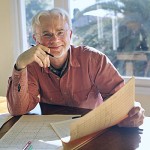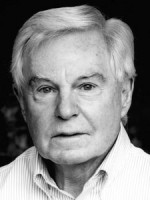Title
Composer and conductor John Adams will address the class of 2011 at Juilliard’s 106th commencement, on May 20 in Alice Tully Hall. Adams and jazz musician Herbie Hancock will receive honorary Doctor of Music degrees; actor Sir Derek Jacobi and choreographer Twyla Tharp will be given honorary Doctor of Fine Arts degrees. This is the 25th year that Juilliard is awarding honorary degrees.
Body
Influential composer and conductor John Adams is known for his contemporary yet emotive music. Born in 1947 and a graduate of Harvard, Adams evokes his New England childhood in works including My Father Knew Charles Ives (2003). Since 1971 he has lived in California, where he taught at the San Francisco Conservatory of Music for many years and was the San Francisco Symphony’s composer in residence. He currently holds the title of creative chair of the Los Angeles Philharmonic. The Dharma at Big Sur (2003), his concerto for electric violin and orchestra commissioned for the opening of the L.A. Philharmonic’s Disney Hall, was inspired in part, Adams has said, by the liberation, excitement, and melancholy the California coast stirred in writer Jack Kerouac. The composer’s City Noir (2009) drew on the vitality and the seediness of Los Angeles; it was commissioned for Gustavo Dudamel’s debut as music director of the L.A. Philharmonic. In February, Adams conducted the Juilliard Orchestra in this 30-minute symphony. In 2003, Adams won the Pulitzer Prize for his choral and orchestral work On the Transmigration of Souls, which he wrote for the first anniversary of the September 11 terrorist attacks.
Among Adams’s most celebrated operas is Nixon in China (1987), which he created with poet Alice Goodman and director Peter Sellars, and which Adams has described as “part epic, part satire, part a parody of political posturing, and part serious examination of historical, philosophical, and even gender issues.” It was performed this season by the Metropolitan Opera, with Adams making his Met conducting debut. His other operas include The Death of Klinghoffer (1991), which he conducted at Juilliard as part of the 2009 Focus! festival, and Doctor Atomic (2005), which had its Met premiere in 2008. As a conductor, Adams has led, among others, the New York Philharmonic, the New World Symphony, and the London Symphony Orchestra. He is also the author of the autobiography Hallelujah Junction: Composing an American Life.
Classical actor Sir Derek Jacobi will receive his degree during his six-week run at the Brooklyn Academy of Music in Michael Grandage’s acclaimed production of King Lear. Jacobi opened the production on London’s West End in the winter; it will be at BAM through June 5. On June 13, Jacobi will take the roles of Prospero and Stephano in Juilliard’s staged reading of The Tempest (see "Love Betrayal, Revenge, Reconciliation").
Born in 1938 in Leytonstone, East London, Jacobi graduated with a Master of Arts in history from Cambridge University, where his performance as Edward II earned him an invitation to perform with the Birmingham Repertory. At Birmingham he soon caught the attention of Laurence Olivier and became a founding member of the National Theater Company. Over the years, his career broadened to include major television and film roles; in 1977, he was awarded a BAFTA TV award for his indelible performance as the stammering Roman emperor in the BBC mini-series I, Claudius. He has also received two Emmys, for guest roles on Frasier and Hallmark Hall of Fame: The Tenth Man. Jacobi’s latest television projects include The Borgias, Joe Maddison’s War, Endgame, the British science fiction series Doctor Who, and Marple: The Murder at the Vicarage. As a film actor, he has appeared in, among others, Gladiator, Gosford Park, Nanny McPhee, and The Golden Compass. Recent credits include The King’s Speech, Ironclad, and A Bunch of Amateurs.
Like his early champion Laurence Olivier, Jacobi has been knighted by both England and Denmark, and has continued to command a much-lauded stage presence. He won a 1985 Tony Award for his performance in Much Ado About Nothing, and received a 2009 Olivier Award for his portrayal of Malvolio in the West End production of Twelfth Night.
Honorary degree recipient Twyla Tharp was born in Indiana in 1941 and founded Twyla Tharp Dance in 1965, just two years after graduating from Barnard. Since then, she has choreographed countless dances for her own company and has also worked with the Joffrey Ballet, American Ballet Theater, the Paris Opera Ballet, the Royal Ballet, New York City Ballet, the Boston Ballet, Hubbard Street Dance, the Martha Graham Dance Company, Miami City Ballet, and Pacific Northwest Ballet. Her Broadway debut came in 1980, with When We Were Very Young, and her 1985 production of Singin’ in the Rain played at the Gershwin and was followed by a national tour. For Movin’ Out, the Broadway musical set to Billy Joel songs that opened in 2002, Tharp received Tony, Drama Desk, and Astaire awards, among others.
Tharp’s 1973 work Deuce Coupe, choreographed to Beach Boys songs for the Joffrey, is considered the first crossover ballet. It was performed by Juilliard in 2007 as part of the spring dance series. In 2006, she created The Times They Are A-Changin’, set to Bob Dylan’s songs, and in 2010, she choreographed Come Fly Away to the music of Frank Sinatra. She also choreographed the films Hair (1979), Ragtime (1981), Amadeus (1984), White Nights (1985), and I’ll Do Anything (1994).
Tharp’s many accolades include the National Medal of the Arts, the Jerome Robbins Prize, and the Kennedy Center Honor. She is a member of the American Academy of Arts and Sciences and an honorary member of the American Academy of Arts and Letters. She has also received a John D. and Catherine T. MacArthur Foundation award (more commonly known as the “genius grant”) and numerous honorary doctorates. Tharp is the author of Push Comes to Shove: An Autobiography, The Creative Habit: Learn It and Use It for Life, and The Collaborative Habit: Life Lessons for Working Together.
Jazz pianist, bandleader, and composer Herbie Hancock was born in 1940 in Chicago, where he was recognized as a piano prodigy and performed with the Chicago Symphony Orchestra at age 11. He began playing jazz in high school and studied music and electrical engineering at Grinnell College in Iowa. In 1962, Hancock’s debut album, Takin’ Off, was released and a year later, he was invited to join the Miles Davis Quintet, where he also played with tenor saxophonist Wayne Shorter, bassist and current Juilliard faculty member Ron Carter, and drummer Tony Williams, recording albums such as ESP, Nefertiti, and Sorcerer. His solo career blossomed with albums including Maiden Voyage, Empyrean Isles, and Speak Like a Child, and he also found success as a film and television composer after writing the score for Michelangelo Antonioni’s seminal 1966 film Blow-Up. In 1986, Hancock won an Oscar for his score for Bertrand Tavernier’s film ’Round Midnight, in which Hancock also acted.
A multiple Grammy Award winner, Hancock most recently garnered best improvised jazz solo (for “A Change Is Gonna Come”) and best pop collaboration with vocals (for “Imagine,” with Pink, India Arie, Seal, Konono No. 1, Jeff Beck, and Oumou Sangare), both from his 2010 album The Imagine Project. In 2007 he received the album of the year Grammy for River: The Joni Letters (2007), his Joni Mitchell tribute album.
Hancock has been a trendsetter throughout his career. His band the Head Hunters’ self-titled 1973 album, with the hit crossover single “Chameleon,” became the first jazz album to go platinum. His 1983 collaboration with Bill Laswell, the Grammy-winning R&B hit “Rockit,” was among the first pop songs to use scratching and other turntablist techniques.








